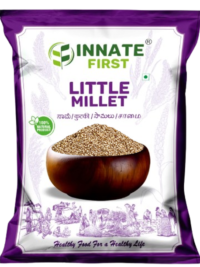Foxtail Millet and Kodo Millet Combo Pack (500g each)
Original price was: ₹295.00.₹230.00Current price is: ₹230.00.
CompareBoth Foxtail and Kodo millets are ancient grains with thousands of years of history. Known for their exceptional nutritional benefits and resilience in harsh climates, these grains are popular in Asia and Africa. Here’s a closer look at their benefits and uses.
Nutritional Benefits
- Rich in Protein and Fiber: Both millets are excellent sources of plant-based protein and dietary fiber, supporting digestion and muscle health.
- Low Glycemic Index: With a low glycemic index, these grains are great for managing blood sugar, ideal for people with diabetes.
- Gluten-Free: Naturally gluten-free, making them excellent choices for those with gluten intolerance or celiac disease.
- Packed with Micronutrients: Both are rich in vitamins and minerals, particularly iron, calcium, magnesium, and B vitamins.
Health Benefits
- Heart Health: High fiber content in these millets helps lower bad cholesterol, promoting heart health.
- Weight Management: Slow-digesting carbs keep you full longer, aiding in weight control.
- Diestive Health: Dietary fiber supports smooth digestion and prevents constipation.
- Boosts Immunity: Iron and zinc in both millets help strengthen the immune system.
Culinary Uses
- Salads: Cooked millet adds texture and nutrients to vegetable and grain salads.
- Breakfast Porridge: Ideal as a nutritious porridge alternative to oatmeal.
- Baking: Millet flour works well in gluten-free breads, cakes, and cookies.
- Main Dishes: A great rice substitute in pilafs, risottos, or casseroles.
Sustainability
Both Foxtail and Kodo millets are drought-resistant and grow well in poor soils, making them eco-friendly crops that conserve water and reduce the need for chemical fertilizers.
Conclusion
Foxtail and Kodo millets offer a powerful combination of nutrition, versatility, and sustainability. Their ease of use and health benefits make them perfect additions to a balanced, health-conscious diet.
| Teas | Beige, Black, Blue |
|---|---|
| brand | Urban |
We've got your back
- One shipping fee
- Free returns within 14 days
- Click & Collect
Import duties information
Let us handle the legwork.
Delivery duties are included in the item price when shipping to all EU. All import duties are included in your order – the price you see is the price you pay.
In a hurry?
We offer Express Delivery for most locations, and our even speedier Same Day Delivery in selected cities.If available, we’ll present the option at checkout.
Express Delivery
- Europe & USA within 2-4 days
- Rest of the world within 3-7 days
- Selected locations







